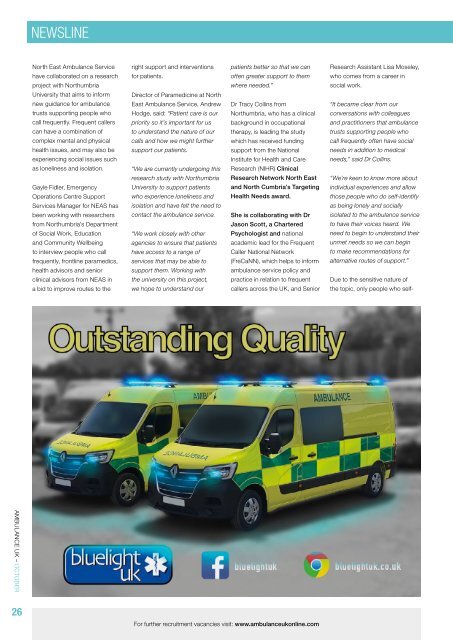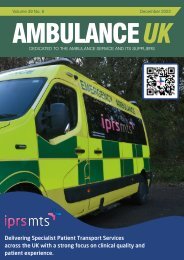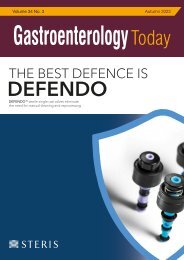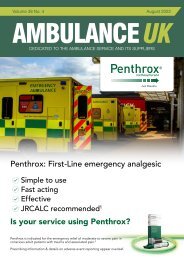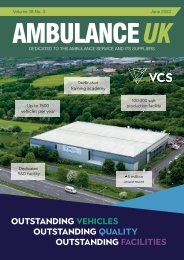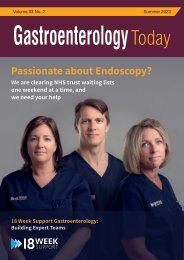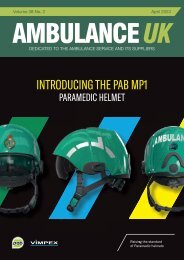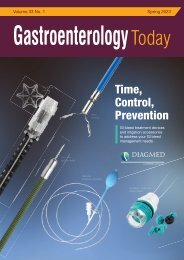Ambulance UK October 2023
Create successful ePaper yourself
Turn your PDF publications into a flip-book with our unique Google optimized e-Paper software.
NEWSLINE<br />
North East <strong>Ambulance</strong> Service<br />
have collaborated on a research<br />
project with Northumbria<br />
University that aims to inform<br />
new guidance for ambulance<br />
trusts supporting people who<br />
call frequently. Frequent callers<br />
can have a combination of<br />
complex mental and physical<br />
health issues, and may also be<br />
experiencing social issues such<br />
as loneliness and isolation.<br />
Gayle Fidler, Emergency<br />
Operations Centre Support<br />
Services Manager for NEAS has<br />
been working with researchers<br />
from Northumbria’s Department<br />
of Social Work, Education<br />
and Community Wellbeing<br />
to interview people who call<br />
frequently, frontline paramedics,<br />
health advisors and senior<br />
clinical advisors from NEAS in<br />
a bid to improve routes to the<br />
right support and interventions<br />
for patients.<br />
Director of Paramedicine at North<br />
East <strong>Ambulance</strong> Service, Andrew<br />
Hodge, said: “Patient care is our<br />
priority so it’s important for us<br />
to understand the nature of our<br />
calls and how we might further<br />
support our patients.<br />
“We are currently undergoing this<br />
research study with Northumbria<br />
University to support patients<br />
who experience loneliness and<br />
isolation and have felt the need to<br />
contact the ambulance service.<br />
“We work closely with other<br />
agencies to ensure that patients<br />
have access to a range of<br />
services that may be able to<br />
support them. Working with<br />
the university on this project,<br />
we hope to understand our<br />
patients better so that we can<br />
often greater support to them<br />
where needed.”<br />
Dr Tracy Collins from<br />
Northumbria, who has a clinical<br />
background in occupational<br />
therapy, is leading the study<br />
which has received funding<br />
support from the National<br />
Institute for Health and Care<br />
Research (NIHR) Clinical<br />
Research Network North East<br />
and North Cumbria’s Targeting<br />
Health Needs award.<br />
She is collaborating with Dr<br />
Jason Scott, a Chartered<br />
Psychologist and national<br />
academic lead for the Frequent<br />
Caller National Network<br />
(FreCaNN), which helps to inform<br />
ambulance service policy and<br />
practice in relation to frequent<br />
callers across the <strong>UK</strong>, and Senior<br />
Research Assistant Lisa Moseley,<br />
who comes from a career in<br />
social work.<br />
“It became clear from our<br />
conversations with colleagues<br />
and practitioners that ambulance<br />
trusts supporting people who<br />
call frequently often have social<br />
needs in addition to medical<br />
needs,” said Dr Collins.<br />
“We’re keen to know more about<br />
individual experiences and allow<br />
those people who do self-identify<br />
as being lonely and socially<br />
isolated to the ambulance service<br />
to have their voices heard. We<br />
need to begin to understand their<br />
unmet needs so we can begin<br />
to make recommendations for<br />
alternative routes of support.”<br />
Due to the sensitive nature of<br />
the topic, only people who self-<br />
AMBULANCE <strong>UK</strong> – OCTOBER<br />
26<br />
For further recruitment vacancies visit: www.ambulanceukonline.com


